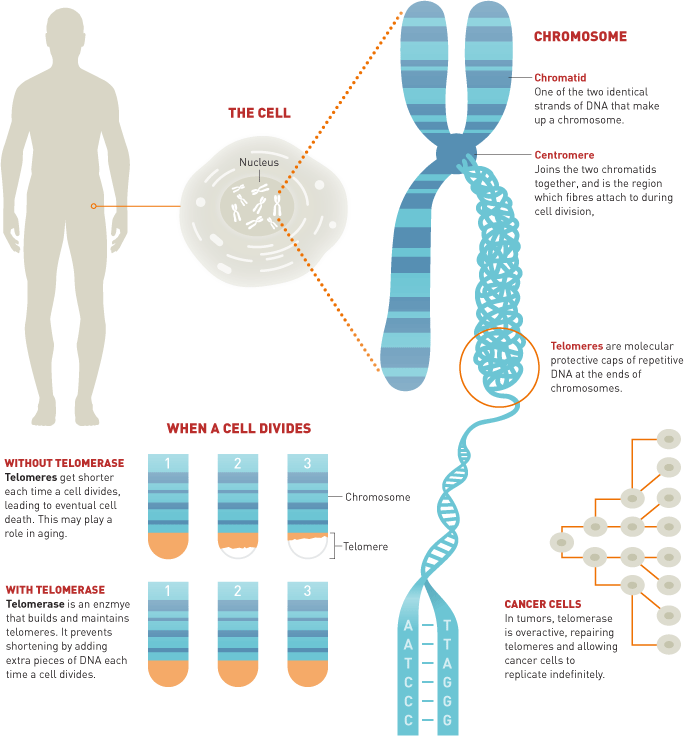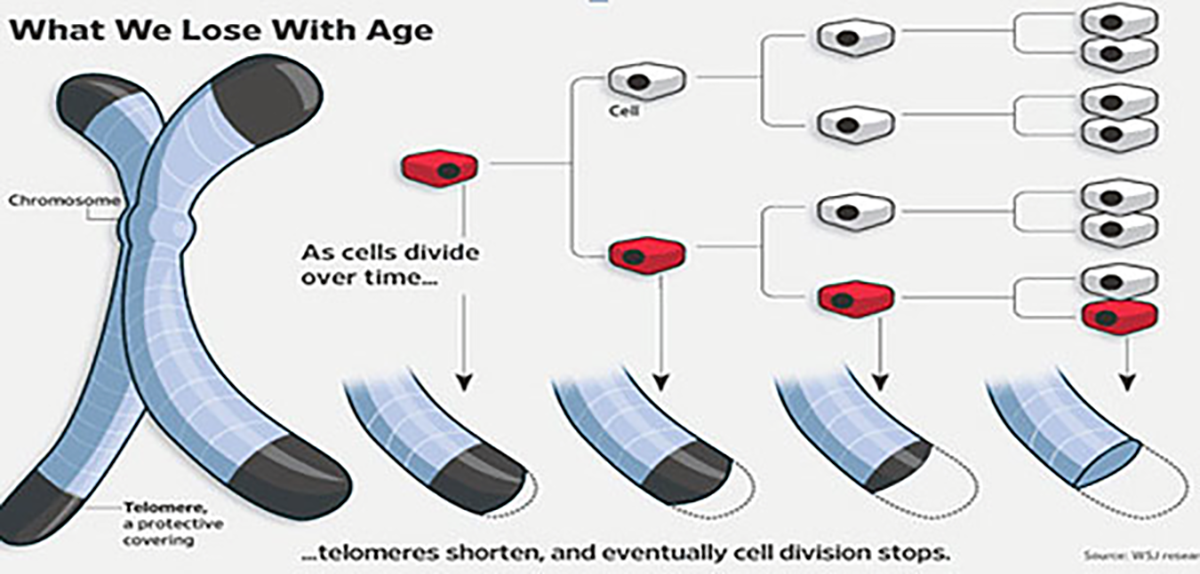Epitalon for Lengthening Telomeres
Telomeres, Aging, and Epitalon
Understanding Telomeres and Cellular Aging
Telomeres are protective caps at the ends of chromosomes that facilitate cell replication. Each time a cell divides, its telomeres shorten. Once telomeres are fully depleted, the cell enters senescence, ceasing replication and beginning to excrete toxins. This phenomenon is known as the Hayflick limit, named after Leonard Hayflick, who discovered in 1961 that normal human cells can divide approximately 40 to 60 times before they stop and undergo senescence (eLife)(BioRxiv).

Telomerase: The Enzyme of Longevity and Controversy
Telomerase is an enzyme that repairs telomeres, allowing cells to continue replicating. In animal studies, enhancing telomerase activity has shown promising results, significantly extending lifespan and mitigating signs of aging. Elizabeth Blackburn and Carol Greider's discovery of telomerase, which earned them the Nobel Prize in Physiology or Medicine in 2009, highlights the enzyme's potential (BioRxiv) (HowStuffWorks).

However, a critical concern arises because cancer cells can activate telomerase production, enabling uncontrolled replication. Thus, increasing telomerase in humans might exacerbate cancer risks by promoting the replication of cancerous cells (HowStuffWorks).
Telomeres, Lifestyle, and Health
Lifestyle factors significantly influence telomere length. For example, meditation has been shown to increase telomerase levels, while childhood trauma and stress can shorten telomeres. A large cohort study published in 2013 demonstrated a direct relationship between childhood stress and a two-fold increase in cancer rates (eLife) (BioRxiv).
Introducing Epitalon
Epitalon is a novel therapeutic peptide consisting of four amino acids (Ala-Glu-Asp-Gly) that has shown promise in repairing telomeres and possessing antioxidant and anticancer properties in animal models. Developed in the USSR in the late 1980s by Professor Vladimir Khavinson, Epitalon has been extensively studied, with research documenting its therapeutic benefits, such as:
- Stress Resistance: Normalizes prolactin levels to increase resistance to emotional stress.
- Reproductive Health: Corrects reproductive impairment in rat models when combined with melatonin.
- Hypothalamic Function: Contributes to hypothalamic normalization when combined with melatonin.
- Antioxidant Properties: Acts as a powerful antioxidant.
- Immune and Neuroendocrine Health: Decreases age-related changes in these systems.
- Telomerase Activation: Activates telomerase to repair and lengthen telomeres without increasing cancer incidence(eLife) (BioRxiv).
Current Status and Future Prospects
Despite promising animal studies, human trials on Epitalon are lacking, and it remains a research chemical not approved for human consumption. However, anecdotal reports suggest some individuals have used Epitalon with positive effects. As awareness grows, informal human trials are expected to increase, especially within the longevity community (eLife)(HowStuffWorks).
Natural Ways to Support Telomere Health
Before considering experimental treatments, several natural steps can help protect telomeres and enhance telomerase activity:
- Minimize Stress: Practices like meditation can positively influence telomere health.
- Melatonin Supplementation: Eliminating light pollution and using melatonin supplements may support pineal gland function, potentially mirroring some benefits of Epitalon.
- Astragalus Extracts: These have been shown to increase telomerase activity (BioRxiv) (HowStuffWorks).
Self-Experimentation with Epitalon
For those interested in self-experimentation, thorough research is essential. Purchase from reputable domestic companies with a strong public presence. Epitalon can be administered orally, nasally, or intramuscularly. Nasal administration is often preferred for its balance of convenience and cost-effectiveness.
Conclusion
Epitalon represents a promising frontier in the quest to extend lifespan and improve health by addressing telomere degradation. While more research is needed, particularly human clinical trials, the existing data offers hope for future advancements in this field. For now, adopting lifestyle practices that support telomere health remains a prudent approach.
Disclaimer: This post is for informational purposes only and does not constitute medical advice. Consult a healthcare professional before starting any new treatment.
Site Disclaimers
General Guidence
The content on this site is provided for educational and informational purposes only and should not be construed as medical advice. Always consult a qualified healthcare provider before making changes to your diet, lifestyle, or health regimen, particularly if you are pregnant or nursing, under the age of 18, managing allergies or known sensitivities, or living with any medical conditions.
At RAW Forest Foods, your safety is our priority. Please note that our products are dietary supplements, not medications. The following disclaimer applies:
* These statements have not been evaluated by the Food and Drug Administration. These products are not intended to diagnose, treat, cure, or prevent any disease.
Ingredient Transparency and Allergen Awareness
We are committed to providing transparent ingredient information to help you make informed decisions. If you have or suspect you have allergies to any of our ingredients, we strongly advise against using our products, as allergic reactions can be severe.
Interaction with Medications
If you are taking any medications, consult with your healthcare provider before using supplements. Certain supplements may interact with medications, potentially altering their effectiveness or causing unwanted effects.
For more details, please review our full Terms and Conditions.






